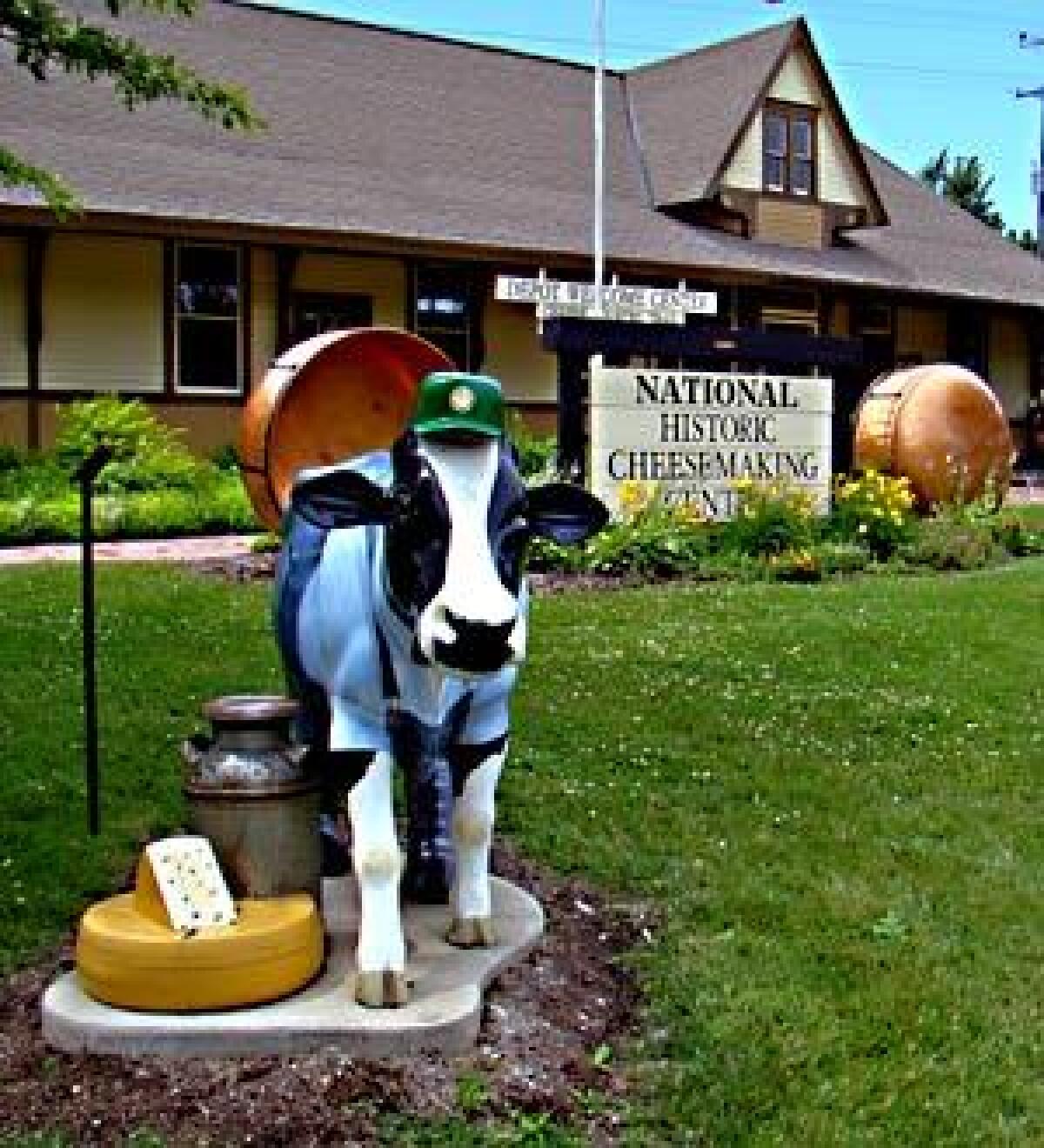Wisconsin cheese makers who take the prize

- Share via
Reporting from Green County, Wis. — Driving along Skinner Hollow Road, through hilly woodlands and across a tranquil stream, a motorist is about as likely to meet a milk truck as another car.
The shiny stainless-steel tankers ply this scenic stretch of blacktop every day of the year, collecting milk produced by the black and white dairy cows that graze in the green pastures on the picture-perfect farms of southwest Wisconsin.
FOR THE RECORD:
Wisconsin cheese: A June 6 article about Wisconsin cheese makers gave the address of the warehouse of Edelweiss Creamery instead of its plant, where visitors can watch cheese being made. The plant address is W6117 County Highway C, Monticello, Wis. For more information, see www.edelweisscreamery.com. —
Some time ago, Skinner Hollow Road was home to three of the 125 cheese factories that once operated in Green County. Thirteen remain, prompting tourism officials to describe the county as a cheese lover’s paradise, an appropriate moniker in Wisconsin where license plates proclaim it “America’s Dairyland” and residents gladly call themselves “cheeseheads.”
In fact, California — which cleverly markets itself as the land of “happy cows” — now ranks No. 1 in milk production. But Wisconsin remains the king of cheese. Although big factories churn out most of what’s found in supermarkets, there are still a number of mom-and-pop producers who welcome visitors to watch as they make award-winning artisan cheeses. Tours often are followed by samplings of the tasty varieties.
The Edelweiss Creamery has stood atop a hillside at a rural Green County crossroads since 1873. It is here that master cheese maker Bruce Workman crafts the only traditional Swiss, or Emmental, cheese made in the U.S.
Workman pours about 1,700 gallons of unpasteurized milk into a giant copper kettle he had shipped from Switzerland. The milk is from local “rotational farms,” where each cow has 1 1/2 acres on which to graze.
“After milking, the cows go back out onto fresh grass,” he explains. “They won’t go back out onto that [same] pasture for another six weeks.”
Each week, Workman makes just four wheels of Emmental, each measuring nearly a yard in diameter and weighing 180 pounds. They’re aged in a nearby warehouse where bacteria in the cheese create carbon dioxide, which, in turn, expands to create the familiar holes.
“When the holes are where we want them [size-wise], we cool the wheels to stop the growth,” he says. “It’s extremely labor-intensive.”
From the Edelweiss factory near the village of Monticello, it’s about an hour’s drive through the rolling countryside of Green and Iowa counties to the historic town of Mineral Point. It’s home to a prized gem in the cheese crown: Hook’s Cheese Co.
Tony Hook describes himself and his wife, Julie, as artisan cheese makers who rely more on their hands than on machinery.
“If milk goes in one end [of a machine] and comes out cheese on the other — all with automation — that’s not artisan cheese-making,” he observes. And, like Workman, the Hooks believe that it takes quality milk to make quality cheese.
“We deal with small farmers with 10 to 60 cows,” Tony explains to relatives who’ve stopped by for a lesson in cheese-making.
The farms “are all family-owned,” he adds. “They’ve been in the family for over 100 years — a couple for 150 years.”
In 1980, the Hooks added Colby to their list of cheeses. Two years later, pleased with their product, they entered it in the World Championship Cheese Contest. It was honored as “best of class” before moving on to be judged “finest cheese in the world” out of a field of nearly 500. The Hooks stopped selling generic blocks of cheese to distributors and began marketing it with their name on the label.
In 2006, their 10-year-old Cheddar won first prize from the American Cheese Society. And this year, for the first time, the couple is selling a 15-year-old cheddar that’s been aged in a cave behind their factory. Given its unique flavor and limited quantity, the cheddar is in great demand. At the Cheese Store of Beverly Hills, it sells for $75 a pound.
Most of Wisconsin’s artisan cheese is sold locally at the factories, in supermarkets and, during the summer, at farmer’s markets. On Saturday mornings, the Hooks and Bruce Workman are among the dozens of vendors with stalls at the Dane County Farmers’ Market, a popular affair on the grounds of the state capitol in Madison.
Many market regulars make their way across Carroll Street to visit Fromagination, a shop specializing in handmade Wisconsin cheeses.
“Ten years ago, there was just a handful of artisan cheese makers,” says owner Ken Monteleone. “Wisconsin used to be known for its bulk Cheddar and Colby.”
That’s all changed, Monteleone adds, thanks in large part to the Master Cheesemaker Program at the Center for Dairy Research at the University of Wisconsin, Madison.
“No other state has such rigid standards,” Monteleone says. “That’s kept us pure.”
Of course, Wisconsin’s cheeseheads have seen those California Milk Advisory Board commercials that portray Midwestern bovines shivering in snow-covered pastures.
“They have spent a boatload of money, and they’ve done a wonderful job,” says Edelweiss Creamery’s Bruce Workman. However, “I’ve been out there and seen their cows. They’re not happy cows when they’re in a feedlot when it’s 100 degrees outside.”
More to Read
Sign up for The Wild
We’ll help you find the best places to hike, bike and run, as well as the perfect silent spots for meditation and yoga.
You may occasionally receive promotional content from the Los Angeles Times.






